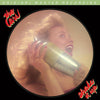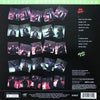





The Cars - Shake It Up (Ultra Analog, Half-speed Mastering)
ORDER LIMITED TO ONE ITEM PER CUSTOMER
[click here to see more vinyl & SACD featuring The Cars]
Ric Ocasek – rhythm guitar, lead vocals (A1-4, B1, B4)
Benjamin Orr – bass guitar, lead vocals (A5, B2-3)
Elliot Easton – lead guitar, backing vocals
Greg Hawkes – keyboards, backing vocals
David Robinson – drums, percussion
Written by Ric Ocasek
1 LP, gatefold jacket
Limited numbered edition
Original analog Master tape : YES
Half-speed Mastering
Gain 2™ Ultra Analog
Heavy Press : 180g
Record color : black
Speed : 33RPM
Size : 12”
Stereo
Studio
Record Press : RTI
Label : MOFI
Original Label : Elektra
Recorded in 1981 at Syncro Sound, Boston
Engineered by Ian Taylor
Produced by Roy Thomas Baker
Remastered by Rob LoVerde
Originally released in 1981
Reissued in 2009
Tracks:
Side A :
- Since You're Gone
- Shake It Up
- I'm Not the One
- Victim of Love
- Cruiser
Side B :
- A Dream Away
- This Could Be Love
- Think It Over
- Maybe Baby
Reviews :
"After the success of their first three albums, the Cars had enough money banked that they were able to build their own recording studio in Boston, and that's where they recorded their fourth album, 1981's Shake It Up. The new setup allowed the Cars more time to tinker with their sound, but also meant that much of the album was recorded in pieces by each member of the band, instead of them being in the same room. While it's not something that seems like an issue on the album's big hits, the pensive "Since You're Gone" and the timelessly silly title track, other songs on the record mostly sound a little lifeless and mechanical, filled with tinny drum machines, odd sound effects, and not much inspiration. "Cruiser" comes across as a pale version of a rocker from either of the first two albums, "This Could Be Love" is a monochromatic ballad, and "Think It Over" is a lesser version of "Shake It Up." The admittedly pretty ballad "I'm Not the One" barely sounds like the Cars; the electronic handclaps, massed backing vocals, and tinkling modern synths make it sound like adult contemporary daytime radio fodder, which is better than the sound they got on "A Dream Away," which sounds like a demo (half)-cooked up on super-cheap gear. Only "Maybe Baby," with its massive drum overdubs and spiraling guitar work, shows the band using the studio to its fullest, matching a strong song with inventive production. Apart from that song, and the two hits that kicked off the album like vintage Cars, the album is the sound of a band spinning its wheels. Coming after the middling success of Panorama, it's not surprising that they swung back toward something more familiar; it's just too bad they didn't have the songs or production savvy to make it work." AllMusic Review by Tim Sendra
Ultra Analog™ : The GAIN 2 Ultra Analog™ Series stems from the use of the Gain 2 system, mastered at half speed from the original master tapes where possible, capturing and uncovering as before undiscovered sonic information.
Half-speed mastering. In half-speed mastering, the whole process is slowed down to half of the original speed. A typical 33 1/3 rpm record is cut at 16 2/3 rpm. The source material is also slowed down (reducing the pitch in the process) meaning the final record will still sound normal when played back. Slowing the whole process down allows more time, which means the end result sounds better and is more efficient — allowing engineering to minimize the effects of inherent limitations within the vinyl format. The result is a more accurate and more open high-frequency response in the half speed vinyl when compared with a normal speed recording.
Ratings :
AllMusic : 3 / 5 , Discogs : 4 / 5



